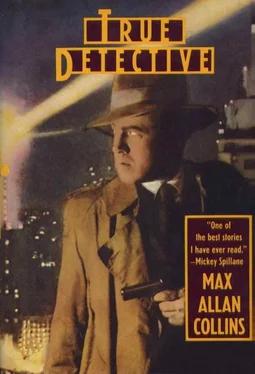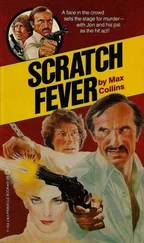And by the end of the third round, Barney had a nice early lead. Canzoneri landed some, including a series of lefts and rights to the head that made Barney’s cheering section groan and wince en masse; but Barney was landing more often, and usually staying out of harm’s way.
Maybe a little bit too much.
“Barney’s too careful tonight,” I told Eliot, having to push it to be heard over the crowd noise. “He’s missed a couple perfect opportunities to really put that guy away.”
Eliot nodded, leaned toward me, and said, “Yeah, but he’s taken the hardest stuff Canzoneri’s got to give, and it isn’t slowing him up any.”
But Canzoneri was a champ, no doubt about it; and in the next round, he took command, and started working on Barney around the eyes. By the fifth round, Barney was bleeding. And slowing down.
So was Canzoneri. The two of them boxed, trying to outpoint each other, clinching often; they’d been trading blows like flyweights, but hitting like heavyweights, and they were getting tired — and saving up for the final rounds.
Then in the ninth round, and I don’t know if he’d been playing possum or not, Barney came alive, turned into a left-hook machine. Canzoneri didn’t know what the hell to think; he did his best to dodge the onslaught, barely retaliating at all. Barney backed him into the New Yorker’s own corner and whaled away at him and the bell rang.
Round ten; final round. The crowd on its feet, yelling, cheering.
Barney landed a light left to the face and a hard right, rocking Canzoneri’s jaw, and followed quick to the face, jab, jab, jab. But Canzoneri found a hard right hand somewhere and sent it to Barney’s cocky face and the two fell into a lover’s clinch. When they came out of the clinch, they went into a brutal slugfest; the killer side of Canzoneri was clear, now, but Barney’s left, bless it, kept the champ off-balance, and the damage to a minimum. When the flurry ended, it was Barney who’d landed the more, the better, blows. Canzoneri looked tired, but angry, and he swung a stiff right to Barney’s midsection; Barney started in slugging with both hands, and suddenly Canzoneri found himself on the other side of the ring. In the midst of backing away, though, Canzoneri lashed out with a hard right to the head, which looked like it had knockout written all over it, from where I stood.
Then again, Barney wasn’t standing where I was; but he was standing, and he was coming back with, Jesus! A great fucking right to the head and the bell rang.
They kept fighting and the ref had to pry ’em apart.
Barney trudged over to his corner — the southwest corner, his lucky corner, the one he worked out of to beat Bat Battalino and Billy Petrolle, in his climb to this night.
We, the crowd, were still on our feet, but we weren’t cheering; there was a hush over the stadium like somebody died.
“Who the hell won?” Eliot said, almost in a whisper.
“Damned if I know,” I said.
“I think Barney.”
“I don’t know. Maybe a draw.”
“In which case the championship stays with Canzoneri.”
“Yep.”
“He’s got it in points, Nate.”
“Who?”
“Barney. Just wait. He’s got it on points.”
We waited; the fighters waited. Forever.
After a while the ring announcer went to the mike, but instead of announcing the winner, begged the crowd’s indulgence for the time this was taking; this was, after all, a championship fight...
I didn’t hear the rest because we booed the son of a bitch out of there.
Finally he came back and did what he was paid for.
He said: “The new lightweight champion of the—”
And that’s all anybody heard, because that meant Barney had won, and the stadium went stark staring nuts, cheering. From ringside, the photogs started flashing, and Barney grinned down at them, tears and sweat streaking his face. I’d never seen him look so happy. Or so tired. He’d given it every ounce he had, and I was proud of him.
Besides, I’d won twenty bucks on the deal.
While the windup fight was under way, a six-rounder between a couple middleweights, Eliot took his leave, as he had to work tomorrow and it was getting late; so I made my way down to Barney’s dressing room alone.
Barney was sitting on the training table, fielding questions from reporters, and not terribly well: yes, he would give Canzoneri a return bout; no, he didn’t know who he’d take on next. His trainer was working on the cuts over his eyes as the reporters fired their questions, and Barney, bushed, dazed, could barely answer, doing little more than flash his shy grin, which was enough to win the press guys over.
The two managers, Winch and Pian, a couple deadpan, stocky guys, cleared the room of the reporters, Winch going out with them. Balding Art Winch was an Italian guy who looked Jewish, and dark haired “Pi” Pian was a Jewish guy everybody took for Italian. Both of them were so businesslike you wanted to hit ’em with pies — Pi particularly.
Pi was enthusiastic tonight, however; with a mug that made Buster Keaton look like Santa Claus, he allotted Barney a pat on the back and said, “Well done, fella, well done.”
Half a dozen or so of Barney’s old West Side pals were let in the dressing room, and they were bubbling; they had a big party planned for him at the Morrison, which I knew about and had been looking forward to. Barney promised to drop by.
“Drop by?” blurted a guy of twenty-eight, with the acne of a thirteen-year-old. “Don’t you even wanna celebrate your champeenship?”
And then Barney’s face lit up; the door had opened and Winch was there, escorting a plump, beatifically smiling late-middle-aged woman in a blue dress; behind wire-frame glasses her eyes were Barney’s.
“Ma!” Barney shouted.
He ran to her, hugged her, tears running down both their faces.
Then he held her at arm’s length and looked at her. “It’s Shabbes, Ma! How’d you get here?”
Solemnly, she said, “It’s Shabbes, Beryl,” which was Barney’s real name, making with an elaborate, Jewish-mother shrug. “I walked. What else?”
“It’s five miles!”
“I had to come. You see, I knew if I come to see you fight, you win.”
“But you hate fighting, Ma.”
“Sitting home waiting, I hate. Besides, I figure if you can take the punishment, I can take it.”
“Anything you say, Ma. Nate, come over here!”
I went over. “Hello, Mrs. Ross. Why don’t you let me drive you home? You can make an exception on riding on the Shabbes. Sick people do it.”
“Aren’t you the smart Shabbes goy? Do I look sick?”
Barney said, “Nate’s right, Ma. You’ll collapse or something, and then you will be sick. Let me drive you.”
“No.”
“All right,” Barney said, “I’ll walk home with you.”
Barney’s West Side pals, listening to all this, protested: what about the party?”
“I’ll be there later,” Barney promised them. “First I got to walk my girl home.”
And he did; all five miles, with his Ma on his arm.
Or so he said; I didn’t walk along with ’em. I wasn’t crazy, and I wasn’t near as Jewish.
I went upstairs and the windup fight was over and folks were wandering up the ramps out into the lobby. They were all wound up, still caught up in the Ross-Canzoneri bout, some of them arguing the decision, most of them saying it was a fight they’d tell their grandkids about, and as I was going down the ramp into the gray cement lobby, I saw him.
Dipper Cooney.
He was dressed like a college kid: sweater, slacks — that was his game. That was how he turned looking twenty when he was nearly twice that into a living; red-haired, freckle-faced, friendly, he did not look like a pickpocket.
Читать дальше












